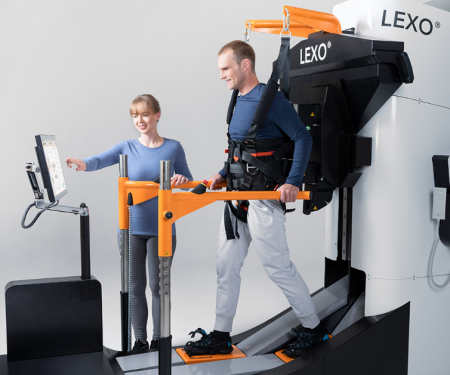
Doncaster and Bassetlaw Teaching Hospitals (DBTH) have marked an exciting milestone with the start of a pioneering new project — the first of its kind in the NHS — a state-of-the-art robotic rehabilitation gym for stroke patients.
This innovative facility at Montagu Hospital represents a major leap forward in stroke rehabilitation, offering advanced robotic equipment and virtual reality-assisted tools that will transform the way patients recover. As the first NHS service to introduce this technology, DBTH is setting a new benchmark for stroke care in the UK.
Part of a wider £1.4 million investment in the site’s Stroke Rehabilitation Service, the new gym is set to be completed by mid-2025. Generous support from the DBTH Charity and Fred and Ann Green Legacy has made this development possible. The project was officially launched in December with a turf-cutting ceremony attended by DBTH colleagues and construction partners IHP Vinci.
The robotic devices, procured at a cost of £700,000, will enable patients to engage in highly intensive, focused therapy sessions. Equipment includes robotic gait trainers, devices for upper and lower limb mobility, and interactive tools to improve cognitive and motor skills. These technologies, combined with virtual reality-assisted features, make rehabilitation more engaging and effective by focusing on repetitive exercises targeting mobility, balance, and coordination.
Dr. Peter Anderton, Consultant for the Stroke Rehabilitation Service, said: “These devices enhance therapy, giving patients more chances to meet recovery goals. By integrating advanced technology with our expertise, we aim to deliver outstanding care.”
Stroke remains a leading cause of disability in the UK, with one in four people expected to experience a stroke in their lifetime. Intensive therapy is key to improving outcomes, particularly in regaining mobility and cognitive functions. DBTH’s new facility will provide the increased therapy intensity needed to enhance recovery rates.
Looking ahead, the Stroke Rehabilitation Service hopes to extend the robotic therapy suite’s hours and collaborate with the South Yorkshire Integrated Care Board to serve a wider region. A two-year music therapy pilot is also underway, using the brain’s plasticity to support speech and language recovery, further enhancing personalised care.
With this ground-breaking development, Montagu Hospital cements its position as a hub of excellence in patient care. For more information about this project and how DBTH Charity supports advancements like this, visit: www.dbthcharity.co.uk.